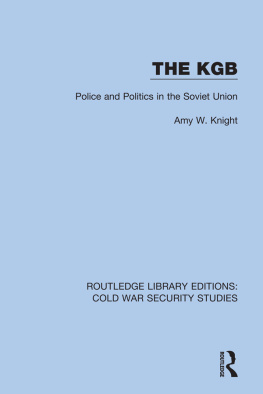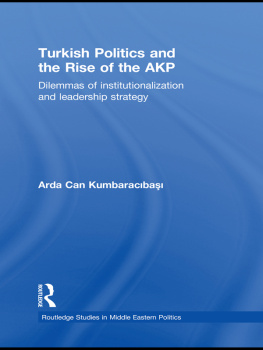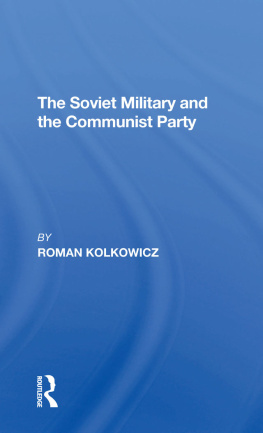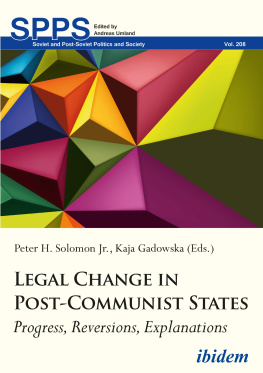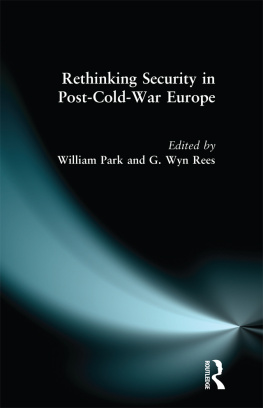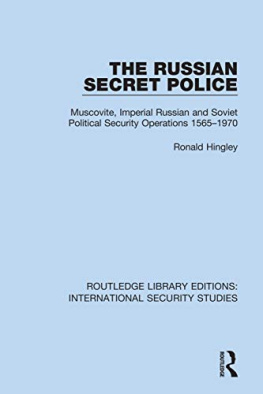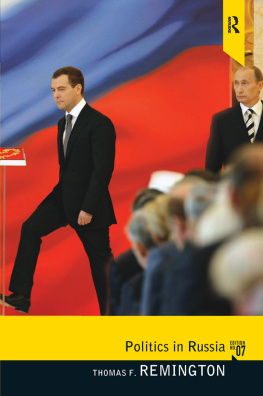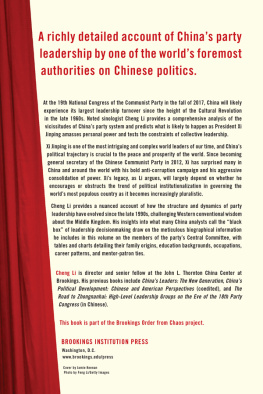ROUTLEDGE LIBRARY EDITIONS: COLD WAR SECURITY STUDIES
Volume 28
THE KGB
First published in 1990 by Unwin Hyman, Inc.
This edition first published in 2021
by Routledge
2 Park Square, Milton Park, Abingdon, Oxon OX14 4RN
and by Routledge
52 Vanderbilt Avenue, New York, NY 10017
Routledge is an imprint of the Taylor & Francis Group, an informa business
1990 Unwin Hyman, Inc.
All rights reserved. No part of this book may be reprinted or reproduced or utilised in any form or by any electronic, mechanical, or other means, now known or hereafter invented, including photocopying and recording, or in any information storage or retrieval system, without permission in writing from the publishers.
Trademark notice: Product or corporate names may be trademarks or registered trademarks, and are used only for identification and explanation without intent to infringe.
British Library Cataloguing in Publication Data
A catalogue record for this book is available from the British Library
ISBN: 978-0-367-56630-2 (Set)
ISBN: 978-1-00-312438-2 (Set) (ebk)
ISBN: 978-0-367-61228-3 (Volume 28) (hbk)
ISBN: 978-1-00-310475-9 (Volume 28) (ebk)
Publishers Note
The publisher has gone to great lengths to ensure the quality of this reprint but points out that some imperfections in the original copies may be apparent.
Disclaimer
The publisher has made every effort to trace copyright holders and would welcome correspondence from those they have been unable to trace.
THE KGB
Police and Politics in the Soviet Union
Revised Edition
AMY W. KNIGHT
Copyright 1990 by Unwin Hyman, Inc.
All rights reserved.
Unwin Hyman, Inc.,
8 Winchester Place, Winchester, MA 01890, USA.
Published by the Academic Division of
Unwin Hyman Ltd,
15/17 Broadwick Street, London W1V 1FP, UK
Allen & Unwin Australia Pty Ltd,
8 Napier Street, North Sydney, NSW 2060, Australia
Allen & Unwin (New Zealand) Ltd, in association with the Port Nicholson Press Ltd
Compusales Building, 75 Ghuznee Street, Wellington 1, New Zealand
First published in 1988
First published in paperback in 1990
Library of Congress Cataloguing-in-Publication Data
Knight, A. W., 1946
The KGB, police and politics in the Soviet Union /
Amy W. Knight. Rev. ed.
p. cm.
Includes bibliographical references.
ISBN 0-04-445718-9
1. Soviet Union. Komitet gosudarstvennoi bezopasnostiHistory.
2. PoliceSoviet UnionHistory. 3. Soviet UnionPolitics and
government1945- . I. Title.
HV8224.K571990
363.2830947-dc20 89-21459 CIP
British Library Cataloguing in Publication Data
Knight, Amy W. 1946
The KGB: police and politics in the Soviet Union. Rev. ed.
1. Union of Soviet Socialist Republics. Komitet gosudarstvenno i
bezopasnosti
I. Title
327.120927
ISBN 0-04-445718-9
Set in 10 on 12 point Palatino by Computape (Pickering) Ltd
and printed and bound in Great Britain by
Biddles Ltd, Guildford and Kings Lynn
To my parents
Contents
1. The Origins of the KGB
2. The KGB: Reform and Rehabilitation, 19541967
3. The KGB and Party Politics, 19671987
Part II: The Structure of the KGB
4. The KGB: Functions, Organization, and Party Control
5. CPSU Cadres Policy and Career Patterns in the KGB
Part III: The Functions of the KGB
6. The KGB and Internal Security
7. KGB Security and Border Troops
8. The KGBs Special Departments in the Soviet Armed Forces
9. The KGB and Soviet Foreign Policy
10. Conclusion
11. Epilogue
- 1. The Origins of the KGB
- 2. The KGB: Reform and Rehabilitation, 19541967
- 3. The KGB and Party Politics, 19671987
- Part II: The Structure of the KGB
- 4. The KGB: Functions, Organization, and Party Control
- 5. CPSU Cadres Policy and Career Patterns in the KGB
- Part III: The Functions of the KGB
- 6. The KGB and Internal Security
- 7. KGB Security and Border Troops
- 8. The KGBs Special Departments in the Soviet Armed Forces
- 9. The KGB and Soviet Foreign Policy
- 10. Conclusion
- 11. Epilogue
Guide
| BSE | Bolshaia sovetskaia entsiklopediia |
| FBIS | Foreign Broadcast Information Service |
| CCE | Chronicle of Current Events |
| JPRS | Joint Publications Research Service |
| KZ | Krasnaia zvezda |
| POC | Problems of Communism |
| RLRB | Radio Liberty Research Bulletin |
| SVE | Sovetskaia voennaia entsiklopediia |
| SZ | Sotsialisticheskaia zakonnost |
I am deeply indebted to a number of persons whose generous help has made this study possible. I particularly want to thank Robert Slusser and George Leggett. Their own excellent scholarship on the Soviet political police served as an inspiration to my work; both painstakingly read my manuscript in its entirety and provided invaluable source materials. I am also grateful to my former teacher at the London School of Economics, Peter Reddaway, who read and commented on the manuscript and whose work on the dissident movement stimulated my initial interest in the KGB. Harry Rigby, Graeme Gill, Werner Hahn, George Breslauer, Robert Sharlet, and Robert Stephan were also kind enough to read and comment upon portions of the manuscript.
A number of other scholars have given advice, expertise, and help. Special thanks are due to Barbara Chotiner, Martin Dewhirst, Rose Gottemoeller, Thane Gustafson, Eugene Huskey, Ellen Jones, Bruce Parrott, and Elisabeth Robson.
My colleagues at the Library of Congress have provided much support. Albert Graham, David Kraus, and George Bogounoff were especially helpful in my efforts to locate sources. I am also grateful to the staff at Radio Liberty in Munich, in particular Keith Bush, Elizabeth Teague, Peter Kruzhin, Herwig Kraus, and Peter Dornin, and to the Centre for International Studies at the London School of Economics for assistance when I served there as a Visiting Fellow. My editor, Lisa Freeman, and her assistant, Peggy McMahon, efficiently and enthusiastically coordinated the production of this book.
Finally, I owe deepest gratitude to my husband, Malcolm, and my daughters, Molly, Diana, and Alexandra for their unfailing support and patience.
THEY HAVE SOME ROOM FOR MANOEUVRE, WITHOUT FUNDAMENTALLY CHANGING THE SYSTEM. THEY CAN RELEASE POLITICAL PRISONERS. THEY CAN EVEN PUBLISH THE GULAG ARCHIPELAGO. BUT THEY CANT DO IT FOR LONG.
VLADIMIR BUKOVSKY (1987)
With the decline of the Brezhnev regime in the early 1980s the Soviet Union entered a period of political upheaval unequaled except by that which followed Stalins death. In fewer than three years three successive general secretaries took power; unprecedented turnover occurred in party and state cadres; and now, amid signs of heated Kremlin debate, what could be substantial political and economic reforms are being introduced. These developments, which are in sharp contrast to the conservatism and stagnation of Soviet politics in the 1970s, have prompted Western scholars to look anew at the Soviet system and to reassess assumptions about the nature of Kremlin politics, just as they did during what seemed to be a turning point in Soviet history after Stalin died. Much of the scholarly debate has centered on the role of Soviet institutions in the political process and on the question of how Soviet leaders gain power and authority. Did Gorbachev, for example, rely on support from a specific group of party cadres to consolidate his power, or did he appeal to institutions outside the party? Where have the various interests lined up over key issues, such as economic reform and relations with the West, and how do they exert their influence?

